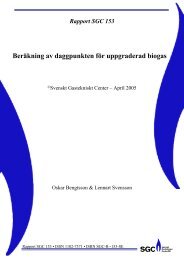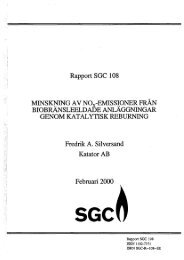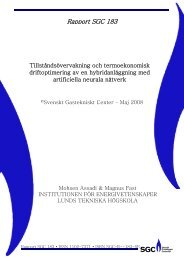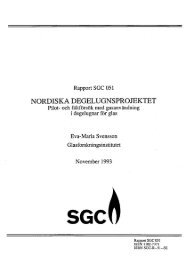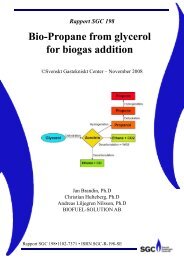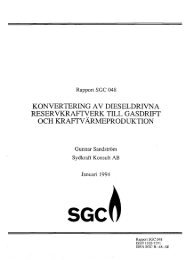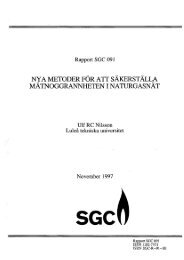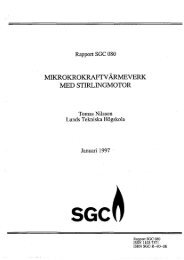Adding gas from biomass to the gas grid - SGC
Adding gas from biomass to the gas grid - SGC
Adding gas from biomass to the gas grid - SGC
- No tags were found...
You also want an ePaper? Increase the reach of your titles
YUMPU automatically turns print PDFs into web optimized ePapers that Google loves.
There is a sulphur tax on all fuel consumption of 1.3 €/kg sulphur dioxide, see table 57. Fuels with asulphur content of less than 0.05% are tax-exempt.Tradable green certificates in DenmarkIn Denmark a system of tradable green certificates is planned <strong>to</strong> support <strong>the</strong> growth of renewableelectricity. It should take effect in 2002. The Danish government wants <strong>to</strong> use this system <strong>to</strong> double<strong>the</strong> proportion of electricity generated <strong>from</strong> renewable sources <strong>to</strong> 20% in 2003. This systemreplaces <strong>the</strong> current direct subsidies <strong>to</strong> renewable energy producers. The benefit of green certificatetrading above that of state subsidies and fixed prices is that <strong>the</strong>y give producers an incentive <strong>to</strong>reduce <strong>the</strong>ir production costs. The current plans were announced in May 2000. The governmentpledged <strong>to</strong> open a central exchange for trading in renewable green energy certificates. This planhas now been approved under EU state rules.Financial supportThe government supports bio<strong>gas</strong> plants financially with up <strong>to</strong> 30% of <strong>the</strong> investment, with a maxiumof € 130,000. Domestic <strong>biomass</strong> heating systems are supported with 18 - 21% of <strong>the</strong> investment inareas without distribution networks for natural <strong>gas</strong> and district heating.Electricity Act of May 31, 1996The Electricity Act provides a major economic incentive for electricity generated by renewableenergy sources. This subsidy consists of two grants. The first (0.023 €/kWh) is a general incentive<strong>to</strong> expand electricity produced <strong>from</strong> renewables. The o<strong>the</strong>r grant (0.013 €/kWh) serves <strong>to</strong> internalisepart of <strong>the</strong> external costs of fossil fuels.If electricity <strong>from</strong> <strong>biomass</strong> systems is fed in<strong>to</strong> <strong>the</strong> <strong>grid</strong>, <strong>the</strong> utilities pay on a basis of avoided costs.Thus, <strong>the</strong> price depends on <strong>the</strong> time at which <strong>the</strong> electricity is supplied. The private producerreceives between 0.019 - 0.132 €/kWh <strong>from</strong> <strong>the</strong> utility. Added <strong>to</strong> this is a government subsidy(reimbursement for energy or carbon tax) of 0.013 €/kWh and a government grant <strong>to</strong> encourage <strong>the</strong>use of <strong>biomass</strong> of 0.023 €/kWh. This means that <strong>the</strong> price varies within a range of 0.055 - 0.168€/kWh. Fur<strong>the</strong>rmore producers may be eligible for a 30% investment subsidy for bio<strong>gas</strong> facilities.Benefits:Private and decentralised electricity producers get a support for renewable energy (wind, hydro &<strong>biomass</strong>) of 0,024 €/kWh, besides 0.014 €/kWh paid <strong>from</strong> carbon dioxide tax. Total subsidy (above<strong>the</strong> market price for electricity) amounts <strong>to</strong> 0.037 €/kWh.page: 101




